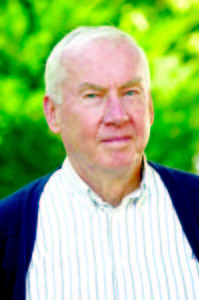Small World: Thinking about guns and gun controls
By Henry Precht
BN Columnist
I hate to raise the subject of gun control knowing that there are probably some Mainers who will be offended, regarding as they do, gun ownership and use as beyond discussion.
A constitutionally-protected right that is nobody’s business.
The violence in Connecticut, however, calls in question that assumption. Â The repeated violence against innocent victims in recent months makes plain that our nation faces a crisis.
We must take steps to limit to the extent possible the slaughter of innocents. When there is a danger, when there is a crisis of the present magnitude, all of us must surrender some of our freedom for the wellbeing of the greater community.
That position runs counter to what the mass murderers — and some of their implicit, complicit supporters — believe. They think that when an individual has a problem, he has the right to work alone for its solution — whatever the costs to society. Most of us, law-abiding citizens, believe that problems should be addressed by groups of like-thinking citizens — men and women who organize and try to persuade the rest of the community of the wisdom of their approach.
These law-abiding citizens think that when they are placed in danger by a criminal it is the primary responsibility of the forces of law and order to take preventive actions. A law-abiding citizen may — and should — resist, but he should not initiate violence. It is the civilized approach. The murderer lives on the frontier of civilization. He believes himself totally independent and free to take whatever actions he alone deems appropriate.
That gap — between the rugged individualist and the integrated member of society — is what divides America on gun control. It applies as well to other basic issues facing us today — e.g., how free should a free market be.
So much for the philosophical context. There is also the problem of applying common sense to gun control. Almost no one wants to deprive a sportsman of the weapons he needs to hunt or practice target shooting. Many, however — particularly those who live in high-crime urban neighborhoods — want to see no assault weapons or special ammunition and other paraphernalia of the armed forces made available to law breakers. This is an urban-rural gap: each side has its own needs, each should recognize the differing circumstances of the other. It’s the way a community or a nation works together.
On the day that the deranged young man in Connecticut murdered 20 small children with an assault weapon, a deranged Chinese man went to his village school and stabbed 21 children with his knife. None died. Guns do kill people. Without the technology that gun manufacturers have put on sale, killers would be nowhere as effective in their lethal intent. The Connecticut killer was enabled by advanced weaponry to shoot each child multiple times with military-type bullets designed to inflict the most grievous wounds.
We do not know the specific grievance the killer held that led him to the first grade classes of Sandy Hook School. Clearly, he was angered by something that in his view was wrong with the community and he was punishing the most vulnerable of its members. He was, in truth, a terrorist. Just as the Arab terrorists who punished 3,000 innocents in New York on 9/11 because they hated what the United States was doing in the Middle East, the Newtown 20-year-old wanted to take revenge for a perceived wrong. There is no other name for these two sets of murderers; they are both terrorists. They should be treated alike in law and restrained by similar measures.
Gun control measures — for example, thorough background checks before any purchase, gun registration, limits on gun purchases and ownership, prohibitions against the manufacture or importation of military-type weapons, permitting reasonable gun ownership for hunting and target shooting — these are the measures that we should all discuss and reach agreement on.
Henry Precht is a Bridgton summer resident.


